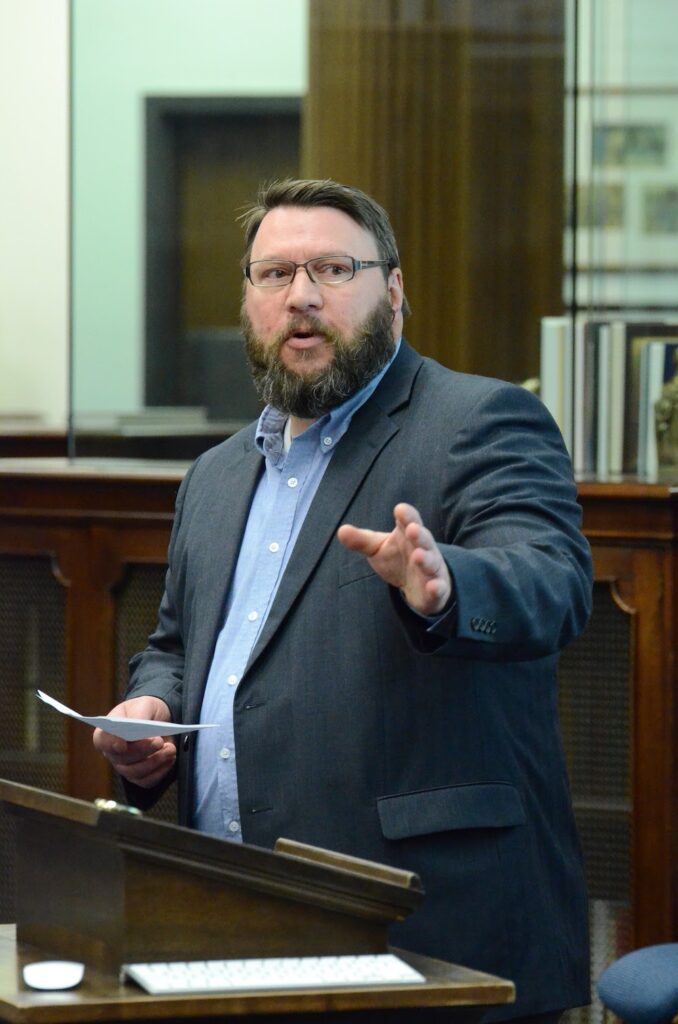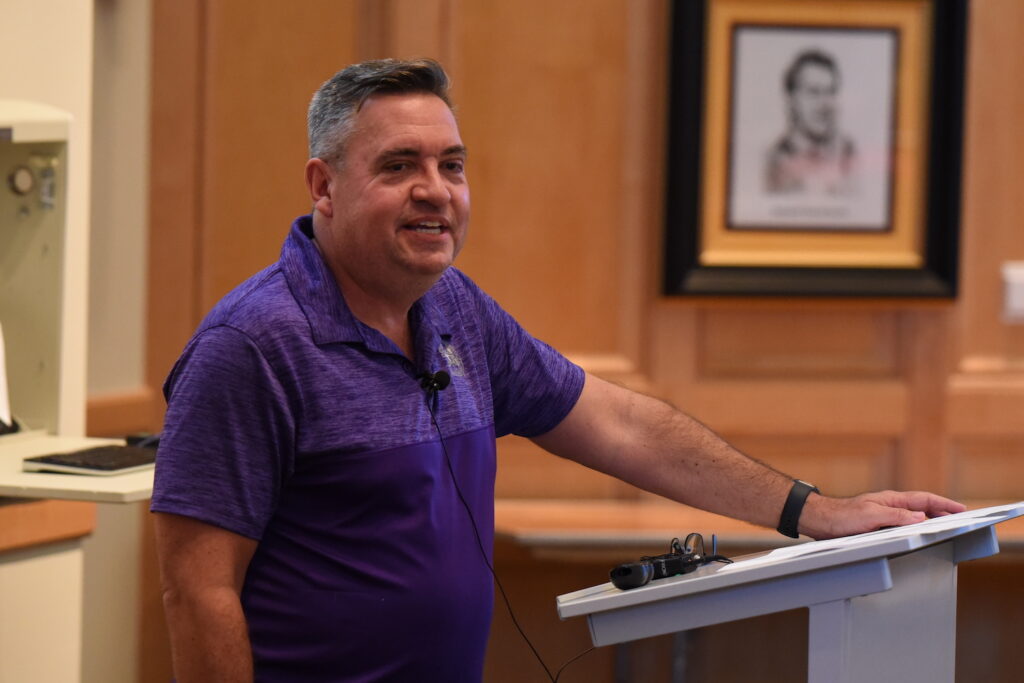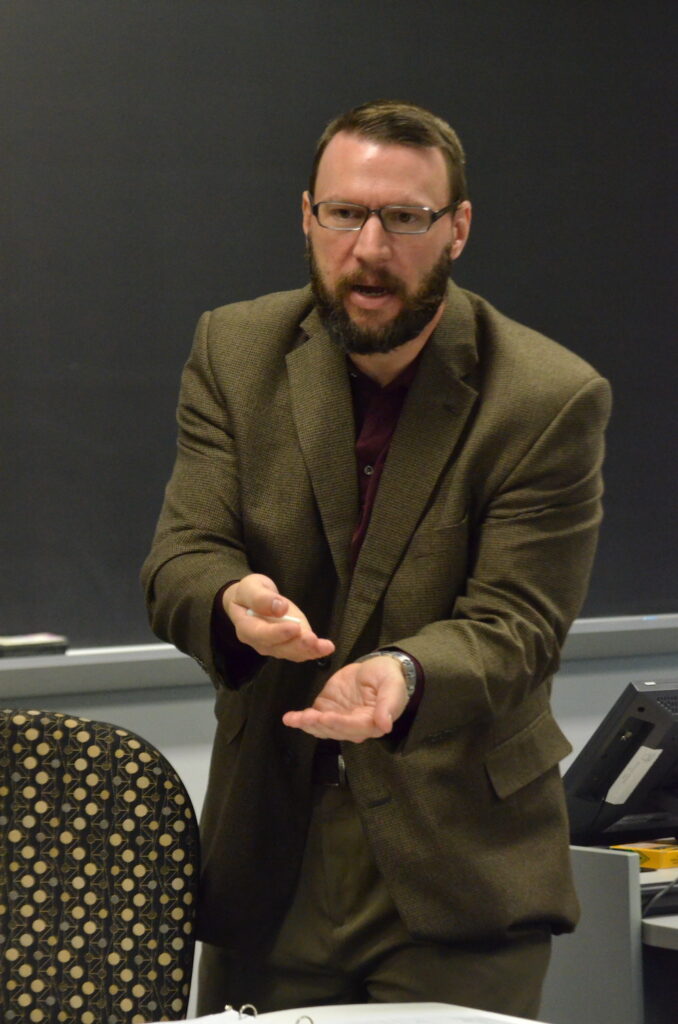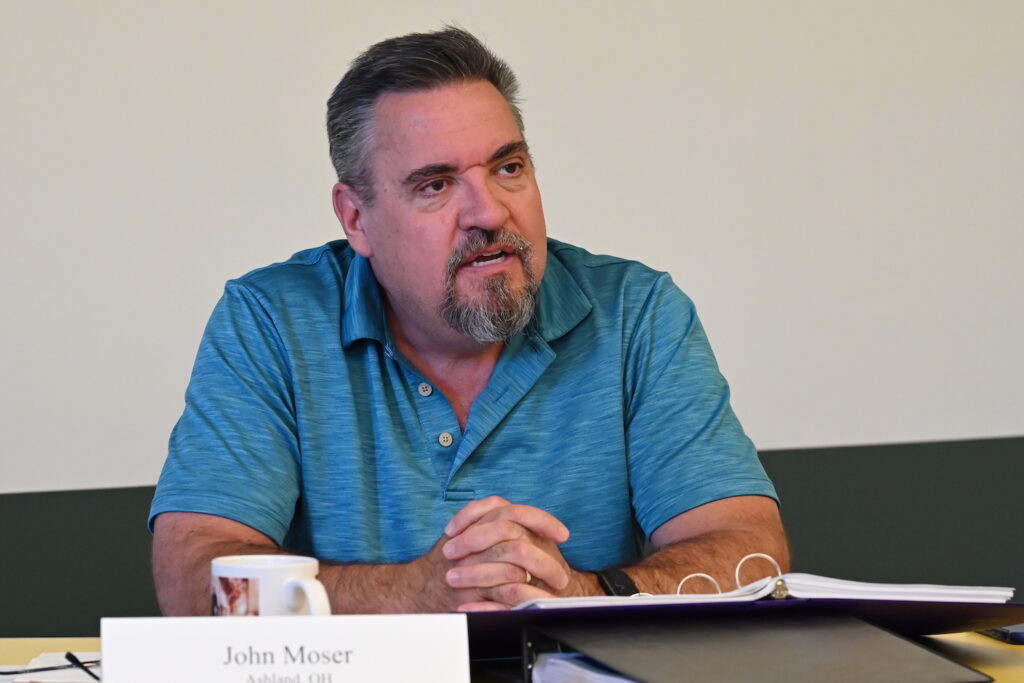Join a Conversation about America
Join a Conversation About America
TAH.org and Ashland University offer two unique Master of Arts degree programs in American History and Government, each designed with the curricular needs of American history and government teachers in mind. We asked Professors Christopher Burkett and John Moser of Ashland University’s Department of History and Political Science to talk with us about the master’s program and its future.
How did the MA program come about?

Burkett: In the late 1990s, Peter Schramm, then executive director of the Ashbrook Center, began a discussion among friends who shared his concern about the lack of awareness of American history and government among incoming college students. From this came the idea to offer a series of free Saturday morning seminars for secondary school social studies teachers. The series, held in the Ashbrook Center on the Ashland University campus, quickly caught teachers’ attention, and participants began coming to Ashland for them from all around, even from out of state. The teachers themselves started asking us to put these seminars together in an academic format as a degree program. With the cooperation of the University and the approval of the Ohio Board of Regents, the Center launched the MA program in the summer of 2005.
What do you see as the qualities of the MA program that distinguish it from other master's programs in American history?
Burkett: The mission of the MA program has always been to reach those interested in American history, especially teachers, to help them develop their ability to think and talk about the things we all need to know as citizens. The program is especially tailored to the needs of teachers; it was originally designed as a summer-based program, taking place during the down-time in teachers’ busy schedules. It is still, to my knowledge, the only program in the country that allows teachers to get a master's degree in history or government while still working full time.
We employ the very best faculty in the country that we can find. Some come from large, well-known schools; others from small colleges. Each are not only experts in their fields; they are teachers—that is, they know how to engage students in conversation about serious ideas. We keep class sizes fairly small—with no more than sixteen students per faculty member. When you get the right number of serious students together in a classroom with great faculty, you get great conversations.
Moser: We have always emphasized discussion over lectures. We also emphasize primary documents over secondary sources. Most importantly, we emphasize learning the content: the people, events, and ideas that make up American history. By virtue of their pedagogical training and experience, they are already excellent teachers. What this MA program can give them is the content expertise they may not have gotten as an undergraduate.
Burkett: We cover what we judge to be the really important, fundamental documents of American history as written by those who shaped our institutions and our past.
We employ the very best faculty in the country that we can find. Some come from large, well-known schools; others from small colleges. Each are not only experts in their fields; they are teachers—that is, they know how to engage students in conversation about serious ideas. We keep class sizes fairly small—with no more than sixteen students per faculty member. When you get the right number of serious students together in a classroom with great faculty, you get great conversations.
Moser: We have always emphasized discussion over lectures. We also emphasize primary documents over secondary sources. Most importantly, we emphasize learning the content: the people, events, and ideas that make up American history. By virtue of their pedagogical training and experience, they are already excellent teachers. What this MA program can give them is the content expertise they may not have gotten as an undergraduate.
Burkett: We cover what we judge to be the really important, fundamental documents of American history as written by those who shaped our institutions and our past.
Of course, other history degree programs use primary documents as well. What is distinctive about the way this MA program uses these documents?

Moser: Too often in other programs, faculty present primary documents as quaint historical artifacts, instead of asking students to take the argument in a document as seriously as we would take it if it were made today.
Burkett: We have faculty who can walk students through the original documents, helping them understand the documents, and the mindset of the writers.
Burkett: We have faculty who can walk students through the original documents, helping them understand the documents, and the mindset of the writers.
How about the design of your curriculum? You cover every major period of the country's history.
Moser: There is a tendency toward specialization in much of graduate education. I did graduate study at the University of Illinois, which has a huge history department, so just about every topic in American history was covered. But the range of courses each student was required to take was pretty limited. In our program, we’re teaching people who have to teach the whole expanse of American history to middle and high school students, so we provide the breadth they need.
Burkett: I’m always impressed with the wide-ranging interests of our faculty. This morning I sat in on a new course offered by Millikin University professor Dan Monroe, a “Great Texts” course on Ernest Hemingway. He’s not only talking with students about Hemingway’s fiction, he’s putting what Hemingway wrote into the larger context of American historical developments: the country’s experience in two world wars, the confrontation between American and European culture, and so on.
Moser: The chance that Professor Monroe would be allowed to teach a course on Hemingway at his home institution is pretty slim. We give faculty the opportunity to develop courses based on their passions, even though these may not be subjects the discipline traditionally values.
Burkett: For example, Professor Lucas Morel (Washington and Lee University) is teaching a course on the writing of Ralph Ellison; I was able to teach a course on the American western in literature and film. Students sometimes wonder why we offer courses covering fiction or even film. That’s because this is really a program on American ideas. The great writers and film directors understand politics and history; they’re not writing in a vacuum. These works become artifacts themselves that both reflect and define American society.
Burkett: I’m always impressed with the wide-ranging interests of our faculty. This morning I sat in on a new course offered by Millikin University professor Dan Monroe, a “Great Texts” course on Ernest Hemingway. He’s not only talking with students about Hemingway’s fiction, he’s putting what Hemingway wrote into the larger context of American historical developments: the country’s experience in two world wars, the confrontation between American and European culture, and so on.
Moser: The chance that Professor Monroe would be allowed to teach a course on Hemingway at his home institution is pretty slim. We give faculty the opportunity to develop courses based on their passions, even though these may not be subjects the discipline traditionally values.
Burkett: For example, Professor Lucas Morel (Washington and Lee University) is teaching a course on the writing of Ralph Ellison; I was able to teach a course on the American western in literature and film. Students sometimes wonder why we offer courses covering fiction or even film. That’s because this is really a program on American ideas. The great writers and film directors understand politics and history; they’re not writing in a vacuum. These works become artifacts themselves that both reflect and define American society.
What do teachers say about why they chose the MAHG program?

Burkett: They like the overall package we’ve described. Putting all these elements together in a program that takes American founding principles seriously creates something greater than the sum of the parts.
Moser: I also hear from students all the time how much they appreciate having two different faculty members in our summer seminars – taught on campus – bouncing ideas off of each other. That’s a large part of what keeps the courses fresh and up to date, as well as so much fun to teach.
Burkett: Yes, that’s a pretty unique feature of our summer on-campus courses. Most of our on-campus courses are co-taught. We try to pair a historian with a political scientist, since those two perspectives complement each other. But most of our faculty can cross lines between the two disciplines.
Moser: I also hear from students all the time how much they appreciate having two different faculty members in our summer seminars – taught on campus – bouncing ideas off of each other. That’s a large part of what keeps the courses fresh and up to date, as well as so much fun to teach.
Burkett: Yes, that’s a pretty unique feature of our summer on-campus courses. Most of our on-campus courses are co-taught. We try to pair a historian with a political scientist, since those two perspectives complement each other. But most of our faculty can cross lines between the two disciplines.
A recent graduate commented that every course she took in the MA program "Looked back to the founding."
Moser: In some courses we explicitly start with that; in others it is an important point of comparison. Even in my course on World War II, we compare the ideology of the combatants. You can’t do this without saying something about the Founding.
Do some students prefer the schedule of the online program – the fact that it allows you eight weeks to consider the concepts in a course?

Moser: It depends on the student. Teachers don’t have the luxury of living in a world of ideas for months at a time, the way traditional graduate students do. As soon as the MA session is over, they have to go back to the real world, where there are classroom management issues, lesson plans to prepare, and anything the principal or administration is throwing at them. There are also the demands of family life and extracurriculars for many teachers.
Burkett: The most serious obstacle facing teachers undertaking a Masters program is limited time. That’s why many of the teachers in our program prefer the on-campus sessions, where they spend one concentrated week doing nothing but engaging in thoughtful discussion of American history and government. For them, it is like a retreat, or like history camp. Sure, they’re tired at the end, but they also feel rejuvenated. They talk about their excitement to get back in the classroom and share what they’ve learned.
Burkett: The most serious obstacle facing teachers undertaking a Masters program is limited time. That’s why many of the teachers in our program prefer the on-campus sessions, where they spend one concentrated week doing nothing but engaging in thoughtful discussion of American history and government. For them, it is like a retreat, or like history camp. Sure, they’re tired at the end, but they also feel rejuvenated. They talk about their excitement to get back in the classroom and share what they’ve learned.
Take the first step.
Learn more about MAHG and how you can be the expert teacher your students need. Admission is conducted on a rolling basis.
